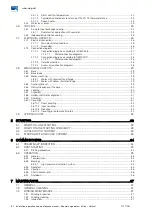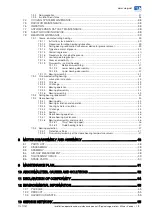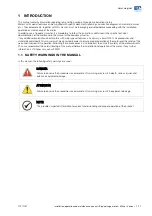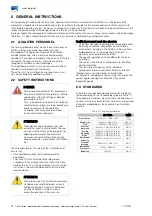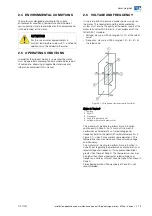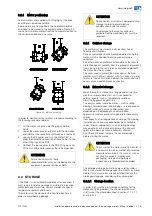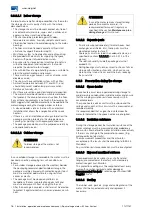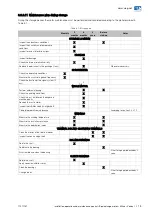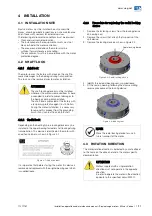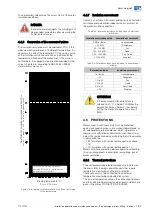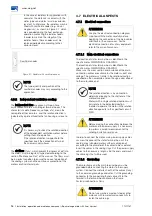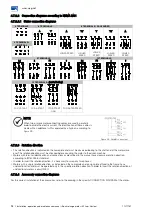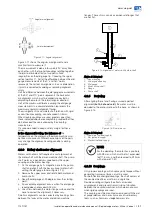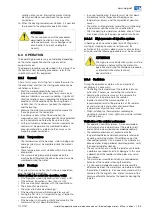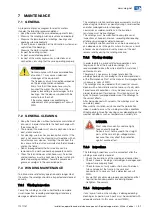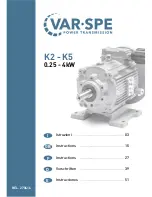
22 l
Installation, operation and maintenance manual – Squirrel cage motor – M line – Vertical 11371757
4.4
INSULATION RESISTANCE
4.4.1
Safety Instructions
DANGER
In order to measure the insulation resistance,
the motor must be turned off and stopped.
The winding being tested must be connected
to the frame and grounded until all residual
electrostatic charges are removed.
Capacitors (if any) must also be grounded
before disconnecting and separating the
terminals to measure the insulation
resistance.
Failure to comply with these procedures may
result in personal injury.
4.4.2
General considerations
When the motor is not immediately put into operation, it
must be protected against moisture, high temperatures,
and dirt, thus avoiding impacts on the insulation
resistance.
The winding insulation resistance must be measured
before putting the motor into operation.
If the environment is too humid, the insulation resistance
must be measured periodically during storage. It is difficult
to establish fixed rules for the actual value of winding
insulation resistance, as it varies according to the
environmental conditions (temperature, humidity), machine
cleanliness conditions (dust, oil, grease, dirt) and quality
and condition of the insulating material used.
The evaluation of the periodical follow-up records is useful
to conclude whether the motor is able to operate.
4.4.3
Measurement on the stator windings
The insulation resistance must be measured with a
megohmmeter
. The testing voltage for the motor
windings must be in accordance with Table 4.1 and
IEEE43 standard.
Table 4.1: Voltage for the winding Insulation resistance test
Winding rated
voltage (V)
Insulation resistance test -
continuous voltage (V)
< 1000
500
1000 - 2500
500 - 1000
2501 - 5000
1000 - 2500
5001 - 12000
2500 - 5000
> 12000
5000 - 10000
Before measuring the stator winding insulation resistance:
Disconnect all connections to the stator terminals;
Disconnect and insulate all CTs and PTs (if any);
Ground the motor frame;
Measure the winding temperature;
Ground all temperature sensors;
Check the humidity.
The insulation resistance measurement of the stator
windings must be done in the main terminal box.
The megohmmeter must be connected between the
motor frame and the winding.
The frame must be grounded and the three phases of the
stator winding must remain connected to the neutral point,
according to Figure 4.4.
Figure 4.4: Megohmmeter connection
Whenever possible, each phase must be isolated and
tested separately. The separate test allows the
comparison between the phases. When a phase is tested,
the other two phases must be grounded to the same
ground of the frame, according to Figure 4.5
Figure 4.5: Connection of the megohmmeter to separate
phases
If the total winding measurement presents a value below
the recommended, the neutral connections must be
opened and the insulation resistance of each phase must
be measured separately.
ATTENTION
Much higher values may be frequently
obtained from motors in operation for long
periods of time. Comparison with values
obtained in previous tests on the same motor
- under similar load, temperature and
humidity conditions – may be an excellent
parameter to evaluate the winding insulation
conditions, instead of using the value
obtained in a single test as the basis.
Significant or sudden reductions are
considered suspicious.
4.4.4
Additional Information
ATTENTION
After measuring the insulation resistance,
ground the tested winding in order to
discharge it.
The testing voltage to measure the insulation
resistance of the space heater must be 500
Vdc and for the other accessories, 100 Vdc.
It is not recommended to measure the
insulation resistance of thermal protectors.
4.4.5
Polarization Index
The polarization index is defined by the ratio between the
insulation resistance measured in 10 minutes and the
insulation resistance measured in 1 minute. This
measurement procedure is always carried out at relatively
constant temperatures.
M
Ω
M
Ω
M
Ω

